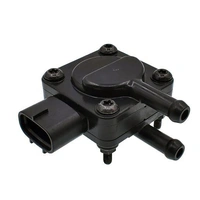
*Oem Quality* DPF Exhaust Pressure Sensor 1865A087 for Pajero NS 3.2L 4M41 06-12
$197.45
A Diesel Particulate Filter (DPF) sensor is a component used in diesel engine systems to monitor the efficiency and performance of the DPF. The DPF is responsible for capturing and reducing emissions of particulate matter (soot) from the exhaust gases of a diesel engine. The sensor provides feedback to the engine control unit (ECU) regarding the status and condition of the DPF.
Common causes of DPF sensor failure can include:
Accumulation of soot: Excessive accumulation of soot particles on the sensor can lead to sensor failure over time.
Contamination: The sensor may become contaminated with oil, fuel, or other substances, affecting its performance.
Sensor damage: Physical damage to the sensor, such as from impact or excessive heat, can cause it to fail.
Electrical issues: Problems with the wiring or electrical connections to the sensor can lead to sensor failure.
Software or calibration issues: Incorrect software programming or calibration settings can cause the sensor to malfunction.
Symptoms of a faulty DPF sensor can vary depending on the specific vehicle and system, but here are some common indicators:
Check Engine Light (CEL) or Malfunction Indicator Lamp (MIL) illuminates: This is the most common symptom, indicating a fault in the DPF system or sensor.
Reduced engine performance: A faulty DPF sensor may cause the engine to enter a reduced power mode or limp mode, limiting the vehicle's performance.
Increased fuel consumption: The engine may consume more fuel than usual due to improper DPF regeneration cycles caused by a faulty sensor.
Poor exhaust emissions: A malfunctioning DPF sensor can result in higher emissions of soot or other pollutants, leading to failed emissions tests.
Regeneration issues: The DPF may not regenerate properly, leading to frequent regeneration attempts or incomplete regeneration cycles.
Loss of automatic regeneration: If the DPF sensor fails, the system may be unable to initiate automatic regeneration, requiring manual intervention.
It's important to note that these symptoms can also be caused by other issues within the DPF system, so proper diagnosis by a qualified mechanic or technician is recommended to pinpoint the exact cause of the problem.

*Oem Quality* DPF Exhaust Pressure Sensor 1865A087 for Pajero NS 3.2L 4M41 06-12
$197.45

*OEM Quality* DPF Exhaust Pressure Sensor for BMW 1 3 5 6 7 X1 X3 X4 X5 X6 MINI
$87.49

*OEM Quality* DPF Exhaust Pressure Sensor for Dodge Nitro Diesel 2.8L ENR ENS 4c
$139.97

*OEM Quality* DPF EXHAUST Pressure Sensor for RENAULT KOLEOS 2.0L M9R 2008-ON
$102.97

*OEM Quality* DPF EXHAUST Pressure Sensor for RENAULT TRAFIC 1.6L R9M 2014-ON
$102.97

*OEM Quality* DPF EXHAUST Pressure Sensor for SUZUKI GRAND VITARA JT419 1.9L F9Q
$102.97

*OEM Quality* DPF Sensor for Toyota HIACE KDH Series 3.0L 1KDFTV 2013-0N
$119.97

*OEM Quality* EXHAUST Pressure Sensor 076906051B 0281006082 for AUDI SKODA VOLKS
$98.97

*OEM Quality* Exhaust Pressure Sensor 13627805152 for Bmw Mini Diesel Engine DPF
$87.49

*Oem Quality* Exhaust Pressure Sensor For Mini Cooper R56 R60 R61 N47 Diesel Eng
$87.49

*OEM Quality* Exhaust Pressure Sensor for Toyota RAV4 ALA49 2AD-FHV 2AD-FTV
$119.97

1865A210 Exhaust Pressure Sensor for Mitsubishi Outlander ZJ (4N13 4N14 Diesel)
$89.97

DPF Exhaust Pressure Sensor for BMW 118d 218d 320d 520d 530d 730d Cooper D
$170.97

DPF Exhaust Pressure Sensor for BMW Series 1 2 3 4 5 6 7 X1 X2 X3 X4 X5 X6 X7
$170.97

DPF Exhaust Pressure Sensor for CHRYSLER 300C 3.0L Diesel 2006-12 Grand Voyager
$139.97

DPF Exhaust Pressure Sensor for JEEP Cherokee KK Wrangler JK 2.8L ENS Diesel Upt
$139.97

DPF Exhaust Pressure Sensor for JEEP Grand Cherokee WK2/WK 3.0L V6 Commander XH
$139.97

DPF EXHAUST Pressure Sensor for MERCEDES VITO 111CDI OM622 2014-ON DIESEL
$102.97

DPF Exhaust Pressure Sensor for Toyota Hiace Hilux RAV4 Corolla Verso Yaris
$119.97

DPF Exhaust Pressure Sensor for Volvo D5255 2.4L (XC60 XC70 S60 S80 V50 V60 C30
$92.97

DPF Pressure Sensor 13628585292 for BMW F40 F44 F45 F46 G20 G21 G30 G31 G32
$170.97

DPF Sensor for MERCEDES A B C-Class W169 W245 C204 CL203 S204 W203 W204 CDI Dies
$139.97

DPF Sensor for MERCEDES E-Class A207 C207 S211 S212 W211 W212 CDI Diesel (E220 E
$139.97